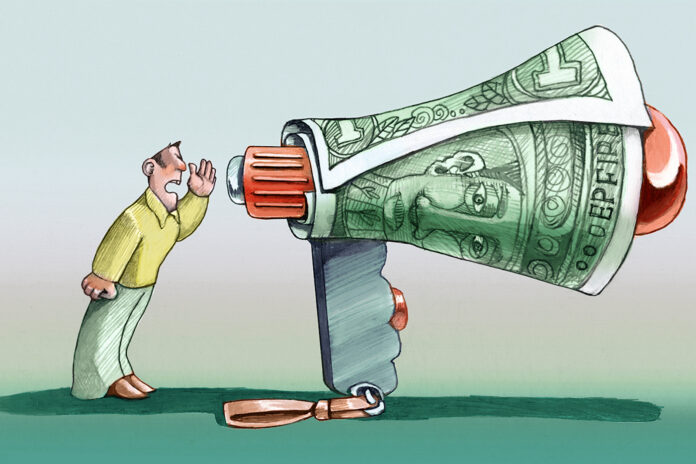If the cannabis industry ever is going to level the playing field with other industries, it’s going to need a whole lot of help from politicians and new legislation that addresses major concerns like banking, Internal Revenue Code section 280E, and other handicaps that have stifled growth since legalization’s inception.
Up to this point, the big players in the industry have spent a relatively modest amount of money on lobbyists to promote their agendas in Washington D.C., but as measures such as the Secure and Fair Enforcement (SAFE Banking) Act gain momentum in the halls of Congress, the number of cannabis lobbyists appears to be growing steadily.
Since the first wave of adult legalization, cannabis companies and advocacy organizations have invested more than $20 million to promote policies that address the industry’s most pressing issues. Looking at financial records over the past six years, it appears spending on lobbyists has ebbed and flowed in a similar pattern with the interest of investors in the industry. The past few years have seen companies ramp up their spending on lobbyists—in part because politicians are warming up to the idea of federal legalization—in addition to promoting social equity and banking reform. Open Secrets, a nonprofit organization that tracks campaign contributions and lobbying data, reports the following total annual contributions to lobbyists from cannabis companies and other stakeholders:
- 2017: $1,623,000
- 2018: $2,403,316
- 2019: $5,153,000
- 2020: $3,846,000
- 2021: $4,547,000
- 2022: $3,586,750
“For a long time, there were only maybe three or four people lobbying for cannabis on the Hill, but now I believe there are eighty-six people registered,” said Morgan Fox, political director for the National Organization for the Reform of Marijuana Laws (NORML), the long-standing cannabis advocacy organization that has been pushing for reforms since 1970. [According to Open Secrets, the total is ninety-five registered lobbyists.] “So that is definitely a sign that the efforts to push legislation on this issue are maturing pretty quickly, and it’s actually worth it to use those resources. It wouldn’t be worth [using lobbyists] if the doors were getting slammed in our faces all the time. But now those doors increasingly are being opened.”
In addition to the SAFE Banking Act, the Marijuana Opportunity Reinvestment and Expungement (MORE) Act was one of the most popular pieces of legislation among lobbyists in 2021 and 2022. The act would remove marijuana from the list of federally controlled substances, create a federal tax on cannabis products, and establish a trust fund to support communities impacted by the war on drugs. A similar proposal, the Cannabis Administration and Opportunity Act (CAOA), was introduced this past summer by Senate Majority Leader Chuck Schumer (D-NY), Senator Cory Booker (D-NJ), and Senate Finance Committee Chairman Ron Wyden (D-OR).
While it’s difficult to determine exactly which pieces of legislation individual companies and their lobbyists are pushing, substantial resources are being allocated to the efforts.
- Canopy Growth Corp.: $580,000
- National Cannabis Roundtable: $436,500
- Cresco Labs: $410,000
- Coalition for Cannabis Policy, Education, and Regulation: $370,000
- Ghost Management Group: $370,000
- U.S. Cannabis Council: $327,500
- Leaflink: $180,000
- Cronos Group: $160,000
- Global Alliance for Cannabis Commerce: $158,750
- Columbia Care: $150,000
- Metrc LLC: $150,000
- Puffco: $140,000
- Trulieve: $120,000
Cannabis trade groups are major players, too. The National Cannabis Industry Association spent $100,000 in 2022 (through November) to promote cannabis legislation, and the Minority Cannabis Business Association spent about $90,000, according to Open Secrets. Other trade industry organizations that hired lobbyists included the Cannabis Trade Federation, the United States Cannabis Council, and the Drug Policy Alliance. However, in Fox’s view, it may not be such a great idea for commercial entities to have their own hired guns in D.C.
“I mean, honestly—and this might sound a little bit self-serving—but rather than hiring their own lobbyists, they should spend more money on the organizations that have a long history working in this space,” he said. “People in the trade associations and the advocacy organizations are much more committed to actually seeing things pass and generally are more well-versed in the issue areas. With additional funding, they would be able to do a whole lot more than any individual firm.”
Fox also noted many of the lobbyists hired by companies are individuals and agencies that are familiar to the increasing number of seasoned C-suite executives who have moved into the industry over the past few years. In terms of politicians who have been the most active in meeting with lobbyists, Fox said Schumer and Booker are among those who are most receptive to meetings.
In a political environment with many more pressing issues and a president who hasn’t shown much interest in cannabis reform, Fox said thinking outside the box might be one of the ways the industry and its lobbyists could make an impact in D.C.
“I heard an interesting idea floated recently. Rather than repealing 280E specifically, you could earmark any money that comes in via 280E until it’s eventually repealed with descheduling,” he said. “At that point, all those funds could be earmarked for restorative justice and social-equity programs, which I thought was pretty fascinating.”











